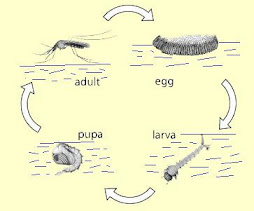COMBATING THE MOSQUITO According Dr Nor Azah the best move to curb the breeding of the mosquito is to destroy its larva or through the use of insect repellents."At the moment, the control of the mosquito vectors depends on the chemical-based and synthetic repellents like dimethyl phthalate, malathion and dimethyl-m-toluamide (DEET).She said even though the chemicals are effective, some could be hazardous apart from being ozone-depleting and continuous use could turn the mosquito vectors resistant to insecticides.POTENTIAL OF HERBS AND SPICESDr Nor Azah suggested the possibility of using herbs and spices, whose essential oils are able to repel insects, be used in insecticides,This is due to the presence of monoterpenoids like limonene, citronellol, geraniol and citronellal that have been reported as having insect repellant properties."As aroma play an important role towards controlling the insects behaviour, essential oils can be used as insect repellents", she said.From FRIM's research, a number of essential oils such as Cymbopogon nardus, Litsea eliptica, Melaleuca cajuputi and Cinnamomum spp demonstrates repellent properties against the Aedes agyptii mosquito.She said essential oils from other plants, reported to be able to repel insects are that from geranium (Pelargonium citrosum), sandalwood (Aquilaria malaccensis) and Sweet Basil (Ocimum spp)."There are other aromatic species that can be found in the Malaysian forest or that cultivated in parks for their medicinal properties and culinary reasons. Essential oils from these species are also preferred by the essential oil industry," said Dr Nor Azah, who has been with FRIM since 1987.FRIMS RESEARCHSince the early 1990s, FRIM has carried out research on the potential for their extracts to be used for various purposes."Our research is focused on the extraction process. We also make trips to the jungle for random sampling of plants that contain essential oils."FRIM's efforts are among the earliest research work on essential oils in Malaysia," she said.According to Dr Nor Azah, since 1994, the research centred on the production of essential oils that emit strong aroma."We found out that essential oils contain natural therapeutic properties that can be used to repel insects apart from being used as deodorants," she said.When FRIM set up its medicinal plants division in 1995, the research work is geared towards bioactivity work. Then, dengue was a frequent occurrence, she said.Dr Nor Azah said the use of various repellents to kill Aedes mosquito could inevitably turn the insect to be resistant to such chemicals.She said the study conducted was on more than 30 plant extracts including that from serai wangi (Cymbopogon nardus), citrus fruits, medang, sandalwood, kemoyang and betel plant.DUAL FUNCTIONDr Nor Azah said further research work is needed on scent-producing plants, which can be utilised for the making of insect repellents and aromatic agents.She said from studies held at FRIM, it was found that aroma-producing plants like citrus, selasih (Ocimum), serai (Cymbopogon) and medang (Cinnamomum) exhibited their potential in repelling mosquito when tested on Aedes aegyptii via the American Society Testing and Materials (ASTM) standard E951-85.Dr Nor Azah said the most effective essential oils discovered so far are that from the citrus plants."Mosquito is repelled by certain aromas from essential oils. Our aim now is to find the essential oils that can kill or knock down this insect," she said.She said the research conducted at FRIM is to also know more about these therapeutic effects on, among others, the human skin."All ingredients, no matter how natural they are, would have side effects if excessively used. Essential oils are not ideal for direct use (and) they should be blended in the form of creams or lotions.Dr Nor Azah also cautioned that some essential oils might cause allergies to pregnant women.
Dr Nor Azah is a senior researcher with medicinal plants programme at FRIM's Forest Biotechnology Division
mosquito control

Importance of water surface during egg-larva-pupa stages
Subscribe to:
Post Comments (Atom)
No comments:
Post a Comment